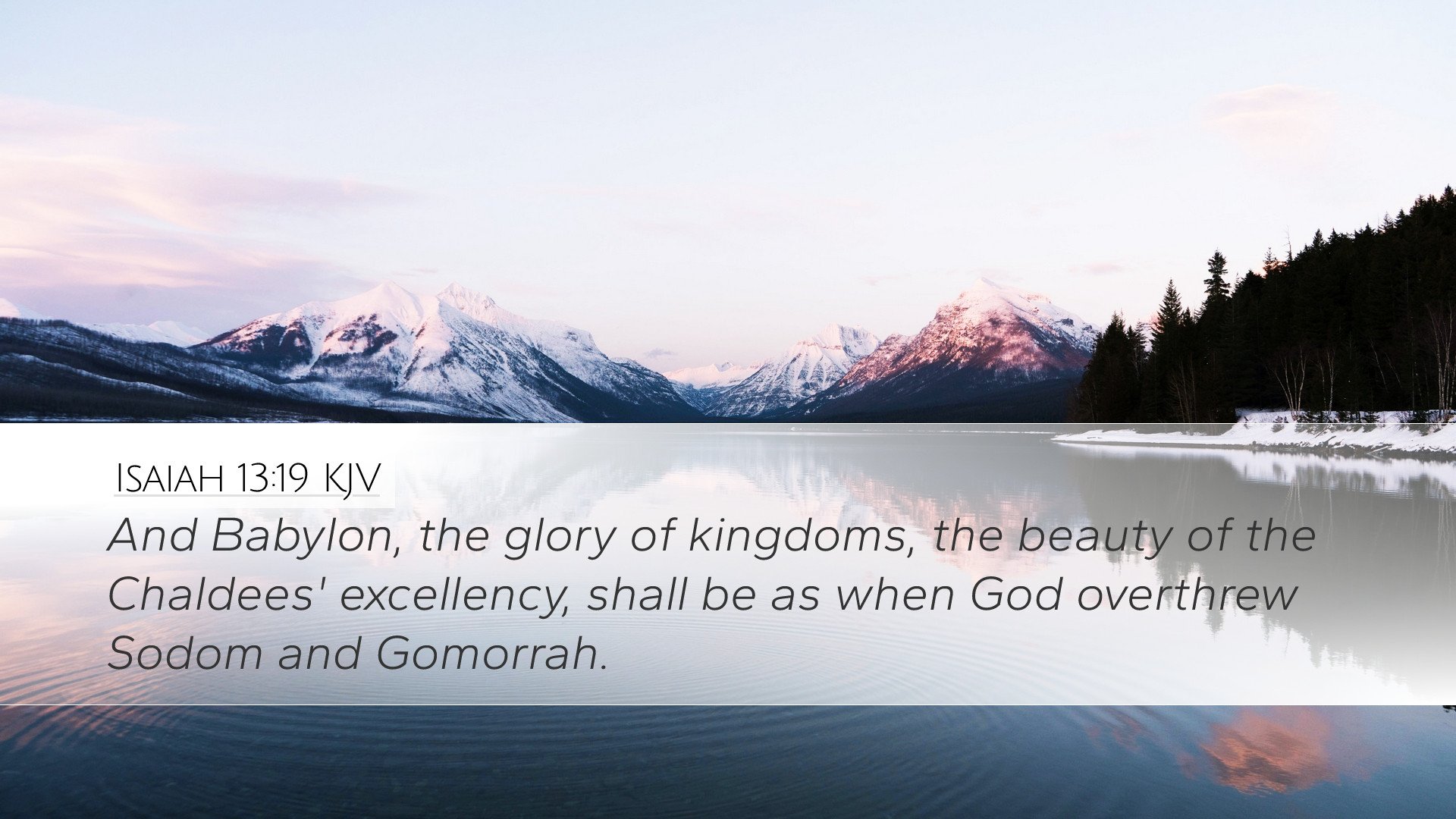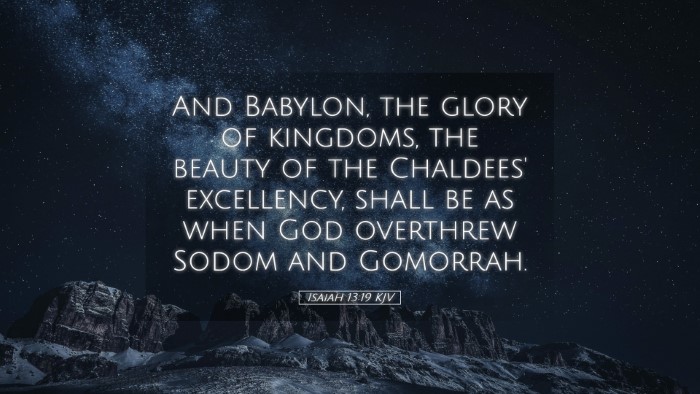Commentary on Isaiah 13:19
Verse Text: "And Babylon, the glory of kingdoms, the beauty of the Chaldeans' excellency, shall be as when God overthrew Sodom and Gomorrah." (Isaiah 13:19)
Introduction
This verse illustrates the absolute and devastating judgment that God pronounced upon Babylon, a prominent power of the ancient Near East. Eastern kings often regarded Babylon as the epitome of human achievement and glory. However, through Isaiah's prophetic vision, God reveals the fleeting nature of such glory when faced with divine judgment.
Historical Context
In the time of Isaiah, Babylon was a flourishing empire known for its military power and cultural accomplishments. This prophecy, delivered in the 8th century BC, serves as a foretelling of the downfall that would beset Babylon as a result of their pride and idolatry. The mention of the overthrow of Sodom and Gomorrah serves as a graphic comparison, underscoring the totality and finality of Babylon's destruction.
Analysis of Key Terms
- Babylon: Symbolizes not just a geographical location, but also represents high human achievement in opposition to God.
- Glory of kingdoms: A reflection of Babylon's status as a royal capital and a center of economic and political power.
- Beauty of the Chaldeans: Identifies the Chaldeans with the wealth and splendor of Babylon, emphasizing the allure of its civilization.
- Sodom and Gomorrah: Represents a complete and catastrophic judgment where the wickedness was met with divine retribution.
Insights from Public Domain Commentaries
Matthew Henry’s Commentary
Matthew Henry emphasizes the futility of placing confidence in earthly powers. He notes that, despite Babylon's grandeur, its end was predetermined by divine will. Henry draws attention to the swift judgment upon Sodom and Gomorrah to highlight how quickly God can dismantle what humanity builds in pride. He describes the desolation of Babylon as an inevitable consequence of their sinful pursuits, paralleling this with the great moral lesson that all nations must reckon with the reality of God's judgment.
Albert Barnes’ Notes on the Bible
Albert Barnes aligns the description of Babylon's demise with its prior prominence, exploring the nature of divine judgment as impartial and absolute. He articulates that God had distinctly proclaimed Babylon's fall as a stark warning against pride and defiance toward divine authority. Barnes poignantly remarks that historical records attest to Babylon's eventual desolation, drawing a direct line between biblical prophecy and historical integrity. He emphasizes that the sentence on Babylon highlights the need for humility in acknowledging God’s sovereignty over all nations and the fleeting nature of human glory.
Adam Clarke’s Commentary
Adam Clarke provides an interpretative lens focusing on the prophetic nature of this verse. He delves into the theological implications of God’s will against dysfunctional human ambitions. Clarke points out that just as Sodom and Gomorrah experienced divine wrath due to their immoralities, so too would Babylon find itself subject to divine judgment. He stresses the notion that God's judgment may seem slow but is inescapable. Clarke enhances understanding by linking the prophecy of destruction to the moral failures of Babylon, which included idolatry and oppression, positioning it as a warning for contemporary societies.
Theological Implications
This verse invites reflection on God's sovereignty, the certainty of judgment, and the transient nature of earthly glory. As pastors and theologians study Isaiah 13:19, they are reminded to warn congregations and communities about the dangers of pride and reliance on human institutions. The judgment upon Babylon illustrates that all human kingdoms, irrespective of their might or beauty, stand under God's authority and are subject to His plans and purposes.
Conclusion
Isaiah 13:19 serves as a powerful reminder of the temporality of human achievements in the light of divine judgment. Its reference to the sudden destruction of Sodom and Gomorrah reinforces the message about the seriousness of sin and God's wrath against it. This prophetic declaration not only foretells the fate of Babylon but also challenges modern believers to reflect on their values and the world around them, prioritizing faith over temporary successes.


